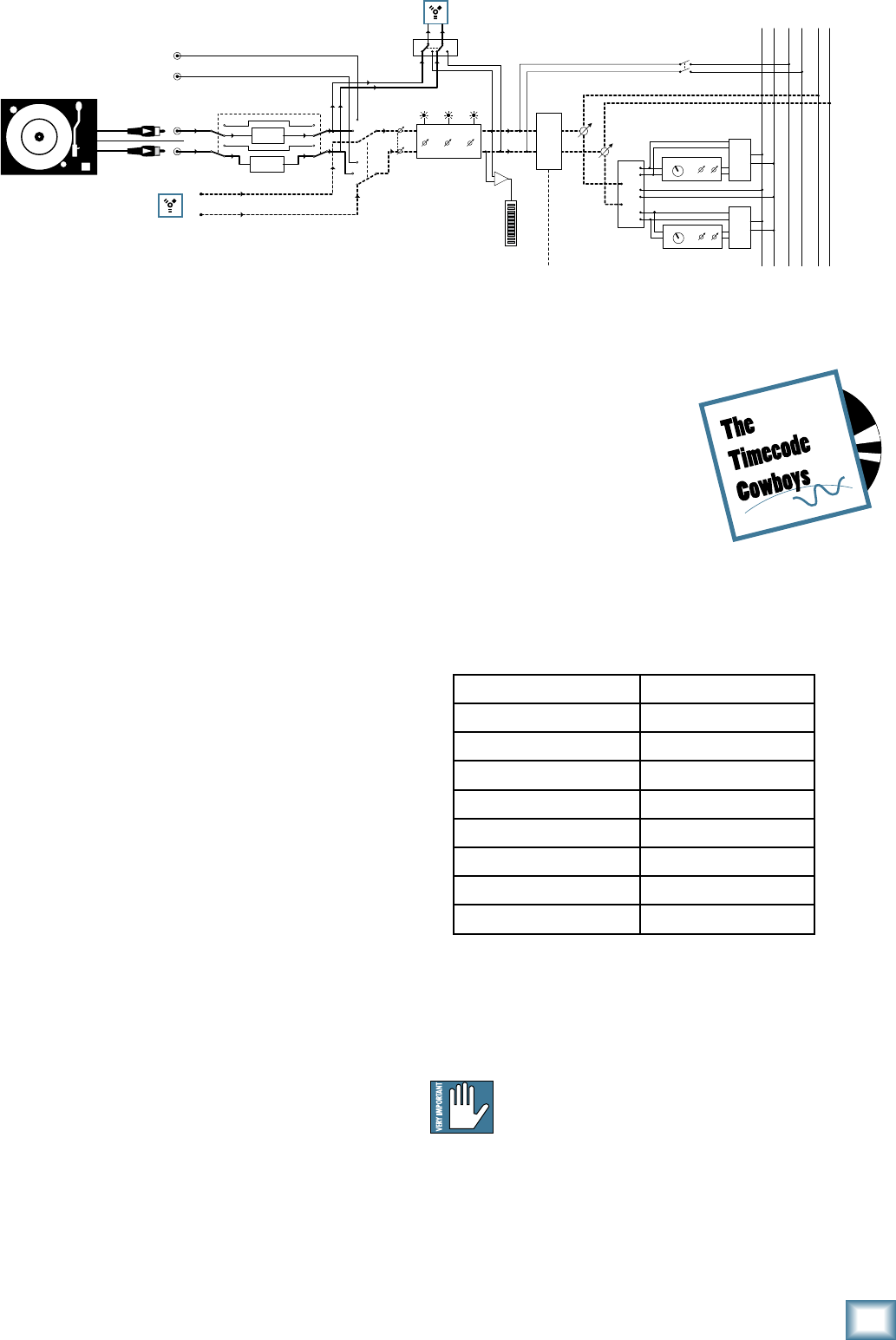
7
Owner’s Manual
Owner’s Manual
Figure 1: FireWire output to your computer from a turntable
switches takes it out via FireWire to your computer. You
can use the source switch to select FireWire or a CD to
play into this program channel without upsetting the
phono FireWire output (see dashed lines in figure 1).
This would be the way to play a timecode record. While
on the subject, I feel a paragraph or two coming on...
Timecode Vinyl/ CD
Timecode vinyl is a conventional vinyl record that
plays timecode information, as do timecode CDs.
The phono output from your turntable is converted to
line-level by the d.4 Pro phono stage (see figure 1). This
analog audio output is converted to a digital stream by
the FireWire interface and sent to your computer.
If you are playing a timecode CD on a CD deck, then
connect it to the line/phono inputs [4] and set the line/
phono switch [5] to line. (If it was connected to the CD
inputs [3], then the computer will not receive the direct
signals, but only those after the source selector, level
and EQ.)
Software provided by your timecode vinyl people takes
the digital stream and creates a virtual turntable on
your desktop. You can add any audio track to the virtual
turntable, and affect its output by scratching your physi-
cal turntable to your heart’s content. The timing of your
audio track is replaced by the timecode of your turn-
table. If the physical turntable slows down or reverses,
so does your audio track. Now you have control over any
audio source you care to play.
You do not want the timecode audio to actually play
in your system. In figure 1, out it goes to the computer
without a care in the world. With the source selector
set to FireWire, you can now bring in the affected audio
from your virtual turntable, and play it through the
same program channel and onto the main mix bus (see
dashed lines in figure 1).
FireWire to computer
Timecode tracks are carefully laid down by talented
timecode musicians. They like nothing better than to
get together for impromptu all-night timecode
jam sessions, and tell stories of the
good old days before 33 1/3.
Much-respected in this field are
“The Timecode Cowboys,” whose lat-
est record “Like a Timecode Cowboy,”
is getting rave reviews.
FireWire stream from computer
The following table shows the outputs from your com-
puter to the d.4 Pro’s FireWire interface:
Each 2-channel stream from the computer enters the
mixer through the FireWire connector and is converted
to analog. Select FireWire as a program choice using the
desired channel’s source switch [30], the same way you
select a phono/line level, or CD player input.
Beware of a possible feedback loop if you are
feeding the d.4 Pro main mix back into an
input that is assigned to the main mix.
From To
Computer output 1 Input to PGM 1 L
Computer output 2 Input to PGM 1 R
Computer output 3 Input to PGM 2 L
Computer output 4 Input to PGM 2 R
Computer output 5 Input to PGM 3 L
Computer output 6 Input to PGM 3 R
Computer output 7 Input to PGM 4 L
Computer output 8 Input to PGM 4 R
FILTER X
CUE
ON
FILT X
wet
L
R
dry
wet
Wet = 100% to Aux, 0% to Main Mix
Dry = 0% to Aux, 100% to Main Mix
dry
PGRM
FILT Y
OFF
BUMP
HP
BP
LP
OFF
FREQ
Q
ON
OFF
BUMP
FILTER Y
HP
BP
LP
OFF
FREQ
Q
LINE/PHONO
VCA
CD
SOURCE
SWITCH
(SET TO
FIREWIRE)
PGM1
LEVEL
PGM1
METER
PHONO
PREAMP
PHONO
PREAMP
L
R
1
2
LINE/PHONO
L
R
FireWire Inputs
FW OUT
LO MID HI
3-BAND EQ
TURNTABLE WITH
PHONO-LEVEL
OUTPUT
LINE/PHONO SWITCH
(SET TO PHONO)
FW OUT
SWITCH


















